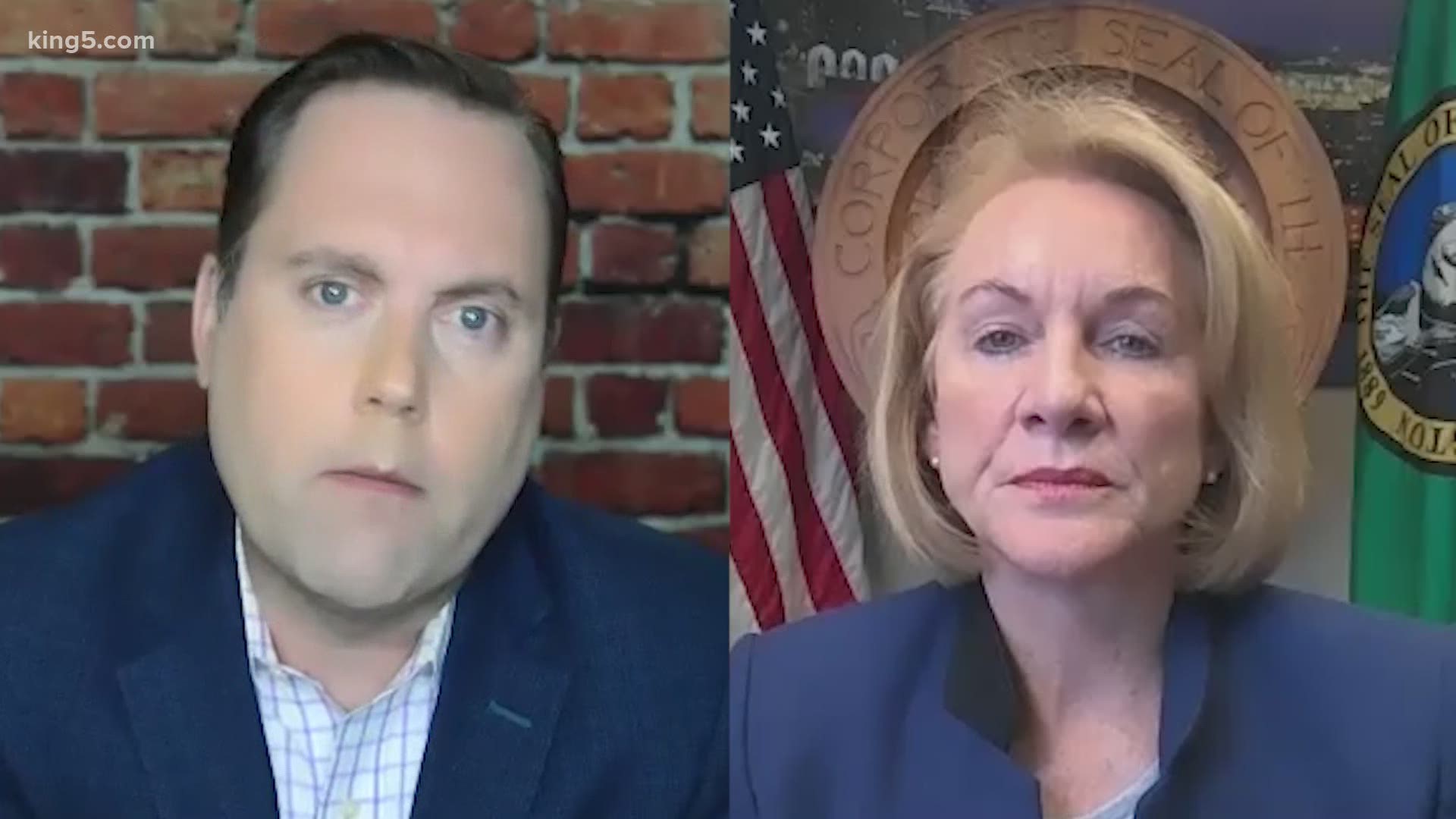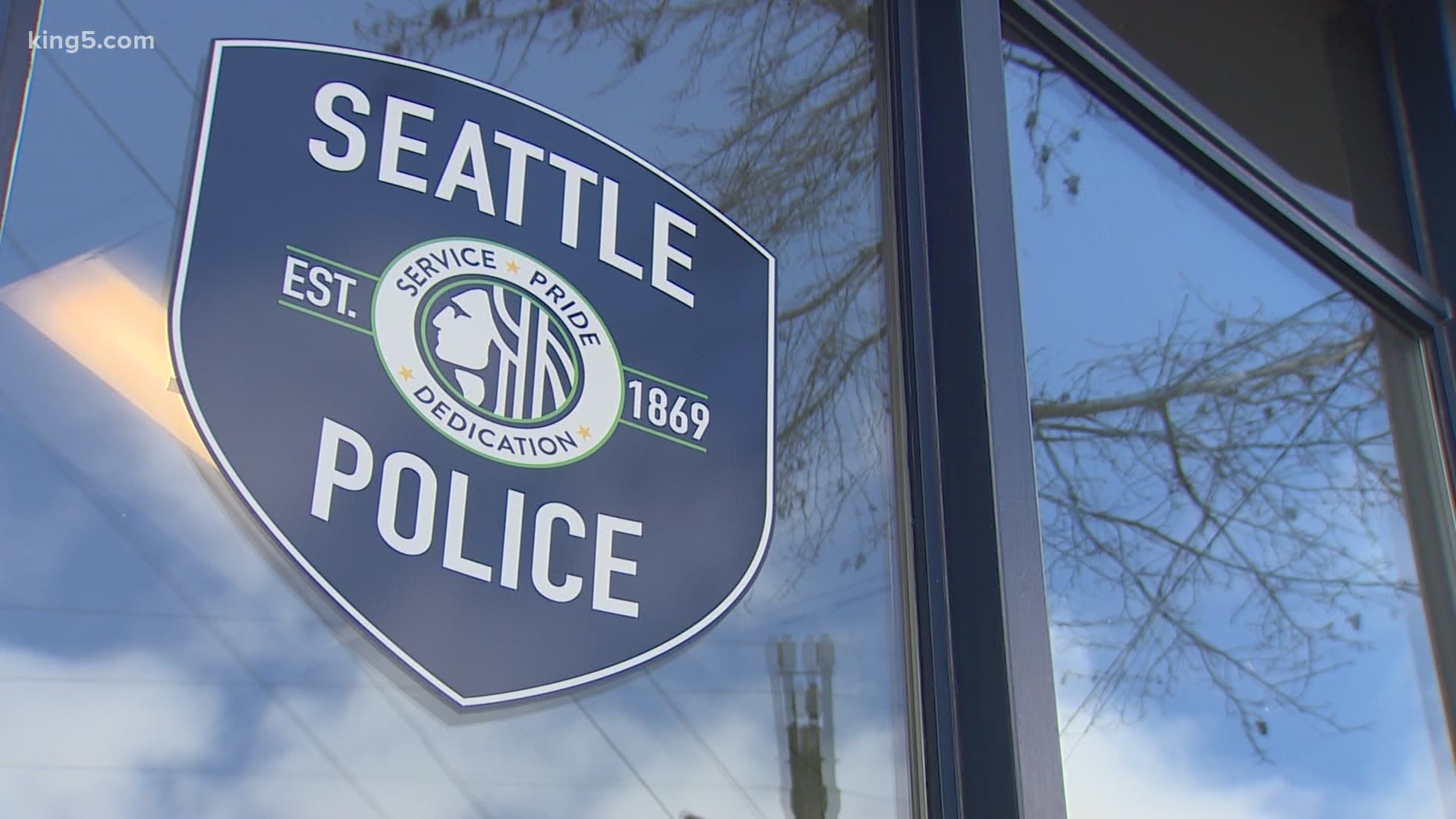SEATTLE — Seattle's Mayor says she's open to further expansion of a program aimed at reducing police calls and increasing the amount of trained mental health professionals on the street. But not at a cost of half the existing police budget.
Those were just a couple of the points which came up during a wide-ranging interview with KING 5. It was Mayor Jenny Durkan's first interview since the tumultuous events of the past month across the city and specifically with the now-disbanded Capitol Hill Organized Protest (CHOP) zone.
"I deeply, deeply regret the loss of life in and around Capitol Hill," said Durkan on Thursday, when asked if she'd like a do-over for any of the events in the CHOP.
The area was created amidst criticism of the police use of force. Durkan was then later criticized for the lack of control in the CHOP zone, which led to multiple fatal shootings in the area.
The mayor said there is a discussion about a permanent memorial to honor the civil rights struggle. But it likely won't involve changing the name of Cal Anderson Park, which is named for the first openly gay state lawmaker and champion of civil rights for the LGBTQ community.
She acknowledged the park, which was a key part of the CHOP, is now part of "shared history" and leaders are discussing how to mark the events of the past several weeks, as well as preserve the Black Lives Matter mural in the street.
The mayor also said she has an "excellent relationship" with Seatle Police Chief Carmen Best, despite the controversy surrounding whose decision it was to abandon the East Precinct. Durkan said ultimately an SPD commander made the call to pull officers from the precinct.
"I think that she is one of the strongest chiefs in the country, I think she's going to lead the way and showing how you can reimagine a police department and make sure that you both do protect community safety," said Durkan.
But at what cost?
On Wednesday, the Seattle City Council heard from a group that wants to cut 50% of the police budget by the end of the year.
"Target numbers themselves are irresponsible if you're not looking at the functions and what the police should be doing versus what perhaps other people can and should be doing," Durkan said, also suggesting that such a large cut would mean eliminating police service altogether.
"That means they are zeroing out the SPD budget for the rest of this year and we will be eliminating police response on all regards because the year is half done. And so, on the one hand, they say they want to reduce it by 50% but now they're saying, well, maybe just 50% of what's left when we vote on it. I think the public has a right to know exactly where they stand and weigh in. I don't believe there's any community in Seattle, that as a whole wants to abolish police services for the rest of 2020," continued Durkan.
But Durkan said she is open to further expansion of the "Health One" program, a unit developed a little more than a year ago that involves the response of firefighters and social workers to handle situations once normally involving police.
Councilmember Andrew Lewis suggested this week following the guide of a Eugene, Oregon program called CAHOOTS, which involves a private service provider, and unarmed mental health professionals trained with deescalating situations.
Proponents of defunding the police have also cited the program as a model.
"CAHOOTS is one model, but really it's the same model. So I'm thrilled that people think it's a good idea because we're doing it. We want to do more of it. I've been talking to (Fire) Chief Scoggins, we have the ability to bring it to scale. When we announced that we said our prediction was that every neighborhood in Seattle was going to want to have access to that, and I think that that's proving true," said Durkan. "There's not only common ground, I think we're already doing it."
But how much money is the city willing to invest, and where will it come from given the constraints caused by the health and economic crisis?
Durkan already has called for $20 million in cuts to the police, the largest of any department, will a citywide shortfall of more than $300 million.
The mayor was coy about whether she would use veto power to reject the recently council-approved payroll tax.
"I've not yet been able to talk to Councilmember [Teresa] Mosqueda to have her answer some of the concerns that I've raised about the payroll tax," said Durkan. But she also said she is ready to move on from a beef with Councilmember Kshama Sawant.
Sawant, a self-described socialist, led a march to the mayor's house last month and Durkan called for Sawant to be investigated and potentially expelled.
Council President Lorena Gonzalez declined to start an investigation.
"She made the decision she made and I think that it's appropriate for us to move forward. I think that the residents and businesses of Seattle will have to judge for themselves the actions of any individual elected official," Durkan said.
When asked if she still enjoyed being mayor, during an unprecedented time in Seattle's history, Durkan said, "I will tell you it is the hardest job in the country bar none."
She added, "The thing that makes it worthwhile is when history is written, I want our city to have shined, to have really made the tough choices to make a difference. And that when we come out of this, we can say, you know, we can look at the horizon and think you know what, we played our part in history. We couldn't do it all but we did our part really well and we're still going to be the best city in America."


